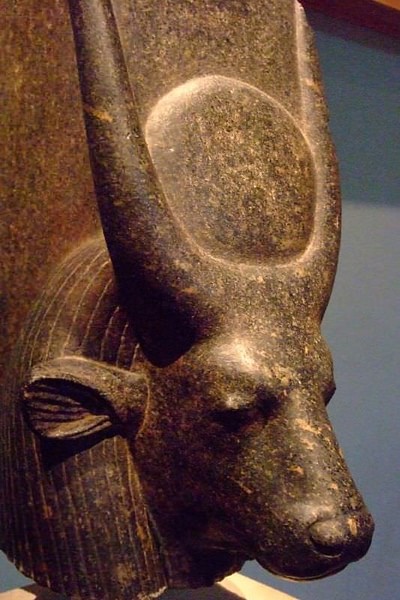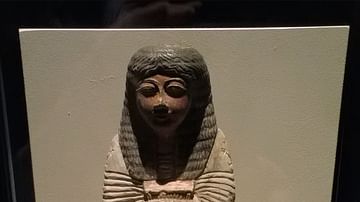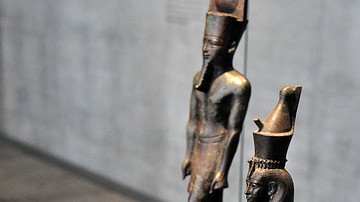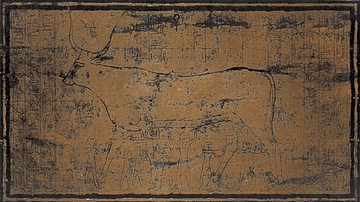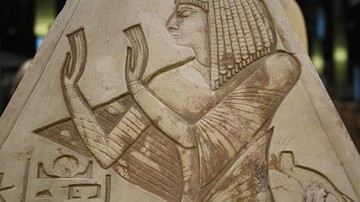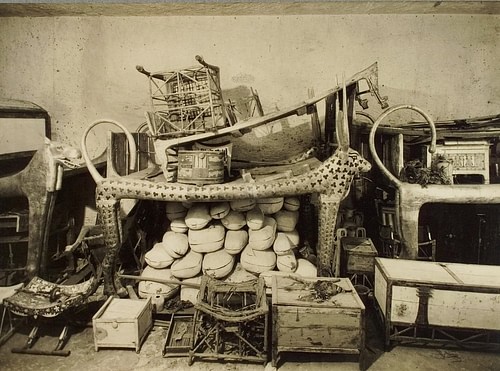
The Book of the Heavenly Cow is an ancient Egyptian text dealing with the rebellion of humanity against the sun god Ra, his destruction of the rebels through the goddess Hathor, the reversal of this decision and Ra's mercy, and his ascent into the higher heavens, leaving earth in a fallen state.
The work has been compared with the Mesopotamian Atrahasis and the biblical tale of Noah's Ark and the Great Flood and is thought to have been known in some form during the First Intermediate Period (2181-2040 BCE) and written during the Middle Kingdom (2040-1782 BCE) but the extant scripts all come from the New Kingdom (c. 1570 - c. 1069 BCE).
The texts were found in the tombs of pharaohs Tutankhamun (r. c. 1336 - c. 1327 BCE), Seti I (r. 1290-1279 BCE), Ramesses II (r. 1279-1213 BCE), Ramesses III (r. 1186-1155 BCE), and Ramesses VI (r. 1145-1137 BCE). The famous photo of the interior of the tomb of Tutankhamun, from after it was opened in 1922 CE, shows a bed frame in the shape of the heavenly cow which, since it is surrounded by other objects, is more often overlooked than appreciated.
Except for the tomb of Ramesses VI, which contained the text on papyrus sheets, the myth was found inscribed on the walls of the tombs and none of them, on their own, are complete. It is only by combining the different finds that scholars have been able to assemble the work and, even so, the conclusion has been lost. The central narrative of humanity's rebellion and the gods' reaction, however, is complete.
The title of the work has been translated as the Book of the Cow of Heaven, the Book of the Celestial Cow, The Destruction of Mankind, and The Destruction of Humanity. Since it was composed before the Atrahasis (c. mid-17th century BCE) or the Great Flood story from the Book of Genesis (earliest date of composition 15th century BCE, latest 6th century BCE), the Book of the Heavenly Cow may have inspired these later works as all deal with a strikingly similar theme.
The Story
The tale begins after Ra had created the world and was king of the gods and humanity. Prior to the beginning of the story, an audience would have been acquainted with the creation myth in which Ra, in his form of Atum, stood on the primordial mound in the presence of the god Nun and created order out of chaos with the help of Heka, the god of magic, and through the agency of magic, aided by the wisdom of Thoth. Afterwards, Ra created the gods Osiris, Isis, Set, Nephthys, and Horus the Elder, known as the lesser-gods when compared with the creator-gods such as Ra and Nun.
The story begins with humans plotting against Ra because he has grown old and they feel he can no longer manage the affairs of the world. Ra hears of their scheme to overthrow him and calls the other gods to council to ask their advice on how to proceed. Nun, the primeval force from which creation sprang, advises Ra to send his Eye to smite the humans and Ra agrees.
The Eye of Ra is most often personified as a goddess who either does Ra's bidding or escapes from his control to wreak havoc in a far-off land before either returning or being forced to come back. These episodes are characterized by Egyptologists as a type of story known as the Distant Goddess and they always involve a transformation of some sort. The Book of the Heavenly Cow is just this type of story as Ra chooses Hathor to carry out his will and destroy humanity.
Hathor is released on the world and does her job well, killing thousands, but then Ra repents and tells her to stop. Hathor, who has now become Sekhmet, is crazed by blood lust, however, and will not return to him. Ra then orders 7,000 jars of beer to be mixed with red ochre to resemble blood and has it taken to Dendera where it floods the plains. When Hathor-Sekhmet arrives in the plains of Dendera to continue killing, she sees the field of `blood' and drinks it, passes out, and wakes up as the peaceful Hathor, friend of humanity. This, the tale explains, is why beer is consumed at the festival of Hathor and why one of her epithets is “The Lady of Drunkenness”. There are, in fact, a number of etiological elements to the myth which explain a wide range of traditions from why maidservants brew beer to the creation of the afterlife of the Field of Reeds.
Once the rebellion has been put down, Ra is weary of having to rule over ungrateful humanity and so asks the goddess Nut to carry him away to the higher heavens. Nut has no idea how to do this, but Nun obliges by turning her into a celestial cow and Ra rides away on her back while other gods help her to transport Ra higher and higher from the earth and the affairs of human beings.
On his way up, Ra creates the Field of Reeds for humanity in the afterlife and sets Osiris and Isis to rule in his place and Thoth to rule over the night sky. The world is now governed by the gods created after and by Ra and, because the creator-god has left their realm, humanity must henceforth strive to maintain ma'at (harmony and balance) with the help of the lesser gods whereas, before, Ra had administered ma'at. There is a clear suggestion in the text that death enters the world with Ra's departure and people will now die and will also have to struggle to keep order.
The Text
The text of the Book of the Heavenly Cow has no division in its original form. Later scholars have divided it into five sections:
- The Destruction of Mankind
- The Withdrawal of Ra
- The Heavenly Cow
- The New World Order
- The Magic of Nut and Ra
The first two are the narrative described above and the rest to the conclusion relate spells to be recited for various occasions and provide etiological explanations for natural phenomena such as stars, the sky, and the sun's movement across the heavens.
The following text comes from The Literature of Ancient Egypt edited by William Kelly Simpson, translated by the scholar Erik Hornung. After Ra's name, one will occasionally find l.p.h., which was the standard salutation to a god or king meaning “life, prosperity, health”. The Heh-gods mentioned are the gods of twilight equated with infinity and often referenced as the Infinite Ones. They symbolized time. Lines given in brackets are explanatory as suggested by the text or provided for clarity. The following reproduces only the first two sections which give the narrative. The full text will be found in the bibliography.
The Destruction of Mankind
Once it came to pass, under the Majesty of Ra, the self-generated god, that when he had been in the kingship over mankind and the gods combined, mankind proceeded to contrive a plot against the person of Ra now that His Majesty, l.p.h., had grown old, his bones being of silver, his flesh of gold, and his hair of genuine lapis lazuli. His Majesty became aware of the plot being contrived against him by mankind and so His Majesty, l.p.h., said to those who were his retinue, “Please summon to me my Eye, Shu, Tefnut, Geb, and Nut as well as the fathers and mothers who were in my company when I was in Nun, and also the god Nun, bringing his courtiers along with him. It is stealthily that you must bring them lest mankind see and they lose heart as you come back with them to the palace so that they may offer their sound advice. It is within Nun, at the place where I originated, that I shall return.”
So these gods were brought right away, and these gods were positioned on either side of him, touching the ground with their foreheads in His Majesty's presence, so that he might state his problem in the presence of the father of the eldest ones [the god Nun], the maker of mankind and the king of humanity. Then they said unto His Majesty, “Speak to us so that we may learn about it.“ Then said Ra to Nun, “O eldest god in whom I originated and you ancestral gods, see, mankind, who originated from my Eye, has contrived a plot against me. Tell me what you would do about this, since I am seeking a solution. I cannot slay them until I have heard what you might have to say about this.”
The Majesty of Nun replied, “O my son Ra, the god mightier than the one who produced you and greater than those who created you, stay put on your throne! The fear of you is great; your Eye shall proceed against those who conspire against you.” The Majesty of Ra said, “See, they have fled into the desert [the lands of chaos without order], their hearts fearful over what I might say to them.” Then they said unto His Majesty, “Send out your Eye that it may smite them for you, those who have conspired so wickedly. No Eye is as capable as it to smite them for you. May it descend it the form of Hathor.”
Then this goddess returned after she had slain mankind in the desert. The Majesty of this god said, “Welcome, Hathor! Have you accomplished that for which you set out?” This goddess replied, “As you live for me, I have overpowered mankind and it was agreeable to my heart.” The Majesty of Ra said, “I shall gain power over them as king. Hold off decimating them!” [at this point Sekhmet came into being whose bloodlust was unquenchable and so Ra must devise a plan to stop her]
The nightly beer-mash for wading in their blood starting from Heracleopolis. Ra said, “Please summon to me speedy emissaries whose pace is as swift as a body's shadow.” So these emissaries were brought immediately. Then said the Majesty of this god, “Run up to Elephantine and fetch me red ocher in quantity.” So this red ocher was brought to him. The Majesty of this great god assigned the Side-locked One who is in Heliopolis [the high priest of Ra, who wore his hair in a side-lock] to pulverize this red ocher, while maidservants were engaged in grinding barley for beer. This red ocher was then added to that beer-mash so that it was just like human blood. Seven thousand jars of beer were thus produced.
Then the Majesty of the King of Upper and Lower Egypt, Ra, came with these gods to inspect this beer – it was the eve of the day when the goddess was to slay mankind during her days of journeying south. The words spoken by the Majesty of Ra, “How good it is! I shall preserve mankind from her.” Then said Ra, “Transport it please to the place where she said she would slay mankind.”
The Majesty of the King of Upper and Lower Egypt, Ra, got up early in the deep of the night in order to have this intoxicating draught poured out. Then the fields became filled to a height of three palms with the liquid through the power of the Majesty of this god. This goddess set out in the morning and she found these fields inundated. Her face became delighted thereat. So she proceeded to drink and it was just fine in her estimation. She returned so drunk that she had been unable to recognize mankind.
The Withdrawal of Ra
The Majesty of Ra then said to this goddess, “Welcome, darling!” [and so beautiful women came to be in Imau, a cult center of Hathor in the western Delta]. The Majesty of Ra then told this goddess that intoxicating draughts shall be prepared for her on the seasonal feasts of the year; maidservants shall be held responsible for this [and so the preparation of intoxicating draughts became the assignment of maidservants on the Feast of Hathor on the part of all people since the first day]. The Majesty of Ra said to this goddess, “Has the heat of sickness become painful?” [referring to the fever of a hangover from drinking] Then said the Majesty of Ra, “As I live for myself, my heart is too weary to remain with them, that I should slay them to the very last one. The reach of my arm shall in no way diminish.”
What the gods who were in his retinue said: “Don't withdraw in your weariness, for you still have power over what you desire.” The Majesty of this god then said to the Majesty of Nun, “My body is weak for the first time. I won't wait until another gets to me” [until another rebellion by humanity]. Then said the Majesty of Nun, “My son Shu, your eye shall serve your father Ra as his protection. My daughter Nut, you shall place him upon your back.” Nut replied, “But how, my father Nun?” [and] said Nut, “Don't be silly, Nun.” [and so Nut became a cow through Nun's magic] Then the Majesty of Ra placed himself upon her back.
Thereupon these men came and they saw him on the back of this cow. Then these men said to him, “…have rebelled against you. We have come so that we might overthrow your enemies who complotted against those who created them.” His Majesty proceeded to his palace on the back of this cow. He did not set off with them. So the land lay in darkness.
When it dawned in the early morning, these men came out carrying bows and clubs and they found a way of shooting at the enemies. The Majesty of this god said, “Your baseness be behind you, O Slaughterers; may your slaughtering be far removed from me.” [and so murderousness originated among mankind]
Then this god said to Nut, “It is in order that I may be uplifted that I have placed myself on your back.” “What is this?” asked Nut [and so she came to be there in both the heavens]. The Majesty of this god said, “Stay far away from them! [humanity] Lift me up! Look at me!” [and so Nut became the sky] Then the Majesty of this god was visible within her. She said, “If only you would provide me with a multitude [to help me]!” [and so the Milky Way came into being]
His Majesty, l.p.h., said, “Peaceful is the field here” [and so the Field of Offerings came into being] “I shall make vegetation grow in it” [and so the Field of Reeds came into being] ”I shall provide them with everything.” [and so planets and stars came into being] Then Nut started trembling because of the height. So the Majesty of Ra said, “If only I had millions supporting her!“ [and so the Infinite Ones – the Heh-gods – came into being].
The Majesty of Ra said, O my son Shu, place yourself under my granddaughter Nut and watch over for me the two groups of Infinite Ones there so that they may live in the twilight. Place her over your head and nurture her. (Simpson, et. al. 290-293)
The latter part of the text of the last three sections involves Ra's commandments concerning Thoth and the moon and the spells one is to recite to maintain order and prevent the chaos which existed before Ra's act of creation at the dawn of time. Although each spell of the concluding paragraphs deals with a different aspect of life, all are unified in the upholding ma'at and maintaining divine order.
Conclusion
The myth placed the responsibility for peace and harmony squarely on human beings. Whereas before, Ra had taken care of his children, after their rebellion it was up to them to manage their own affairs in accordance with what they knew of the will of the lesser-gods who presided over the earth. Humans were no longer coddled by their creator; they were forced to grow up and take responsibility for their own actions and recognize the debt they owed to the gods who gave them life. According to scholar Edward F. Wente, Jr:
Aside from the theme of the sun god's ultimate compassion toward a rebellious mankind, whose annihilation he initially sponsored, the story explains how, as a result of humanity's fallen nature, the universe as we know it came to be, with the sun, moon, and stars moving across the sky, which the Egyptians depicted in an accompanying scene as a cow uplifted by the god Shu and eight assisting deities. (Simpson, 289)
Like the Mesopotamian Atrahasis or the Great Flood story from Genesis, the Book of the Heavenly Cow relates a tale of transformation and maturation in the relationship between humanity and the divine. In all of these texts, a supernatural force creates humanity, comes to be displeased with the results, and decides to erase its mistake. Those who survive are then responsible for establishing a new and more mature relationship with their creator which requires growth and personal accountability. In this, the Book of the Heavenly Cow is a transformational text reminding one that, even though the gods may always be there, it is one's personal responsibility to be worthy of their gifts.
